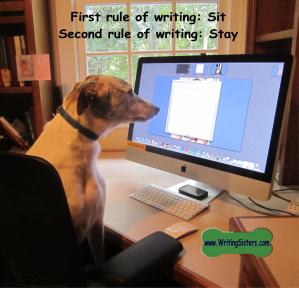
When we started The Shepherd’s Song, the ideas came fast and the words flowed. We didn’t stop that precious flow by asking ourselves questions. Our mother had taught us that. Get the words down, then you can shape them and refine the writing.
Here are some tips for rewriting, and some examples from the first chapter of The Shepherd’s Song.
1. Stick to what the character is personally experiencing.
FIRST DRAFT: The ambulance doors opened and Kate’s stretcher was pulled out of the back. The wheels hit the ground and they were inside within seconds. Doctors and nurses surrounded her, each performing a different task, all with the goal of saving her life.
This first draft tells us what is happening. We hear the voice of a narrator. But if the scene is from Kate’s POV, we want to show the reader only what she is experiencing. Here’s the rewrite:
FINAL DRAFT: She felt jarred as the stretcher was pulled forward, then lights and swirls of snow. The wheels hit the ground and they were inside within seconds. Masked faces in white and green hovered over her. Gloved hands touched her.

2. Do a search for the word “thought.” See if you need it.
FIRST DRAFT: A brief memory of her car plowing into another vehicle flashed across her mind. ‘A car accident,’ she thought. ‘I’ve been in a car accident.’
Extra words take the reader out of the character’s head. There’s no need to tell the reader that the character is thinking. Just say it.
FINAL DRAFT: A brief memory came – her car sliding on the slick road, the sound of breaking glass and crunching metal. A car accident.
3. Limit speech tags.
FIRST DRAFT: “What happened?” the young man doing the CT scan asked.
“Car accident,” the nurse said. “A big pile-up on I-95.”
“No kidding. She doesn’t look so good. Is she going to make it?” he asked, helping them roll Kate into the room.
“Too early to tell,” Dr. Belding said.
The nurse shrugged. “You never know with these trauma patients. I’ve seen ones in worse shape make it, but not many. If I were the kind to bet, I’d bet ‘no’ for this woman.”
“Too bad,” the young man said.
Can you see how awkward this is? The tags (he said, she said), are slowing down the action and are reminding us that it is a written story.
FINAL DRAFT: She heard the voices back and forth over her stretcher.
“What happened?”
“A big pile-up on I-95. Twenty-five cars, six semis and one bus.”
“No kidding. She doesn’t look so good. Is she going to make it?”
“You never know with these trauma patients. I’ve seen ones in worse shape make it … but not many.”
Kate closed her eyes again. I might die.
Here’s another place we rewrote, removing the tag.
FIRST DRAFT: He picked up the receiver and said, “This is John McConnell.”
FINAL DRAFT: He fumbled for a moment with the receiver, then got it to his mouth with shaking hands. “This is John McConnell.”
Having a checklist for rewrites is helpful and a quick way to review a manuscript. Using search features allows us to quickly find and replace words like “thought” or “said.”

We’ll share four more tips next time. Do you have tips that you use for rewriting?
Betsy and Laurie
http://www.WritingSisters.com

 Outside my window a bird is singing. So long and loud for a tiny bit of feathers. The song is varied and the notes rise and fall, fluid and melodic. Truly he is singing his heart out. Simple and beautiful. The night is gone and the sun is rising. As he sings, I type.
Outside my window a bird is singing. So long and loud for a tiny bit of feathers. The song is varied and the notes rise and fall, fluid and melodic. Truly he is singing his heart out. Simple and beautiful. The night is gone and the sun is rising. As he sings, I type.









 There. Don’t you feel better?
There. Don’t you feel better?








